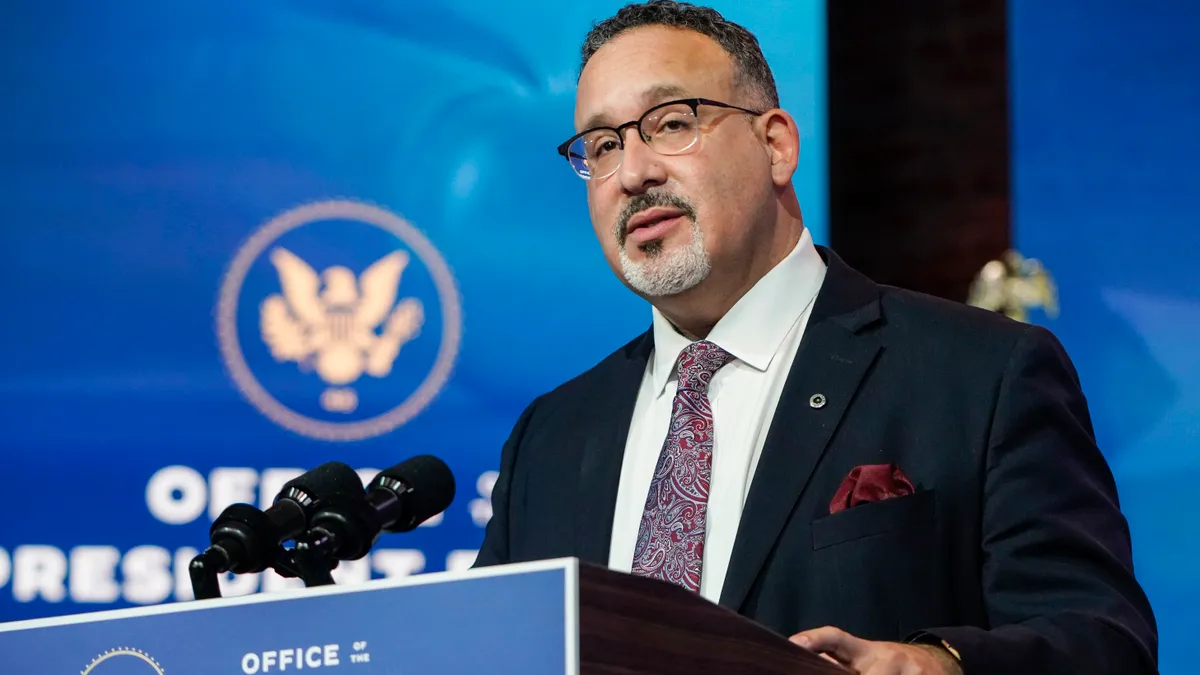Dive Brief:
- The U.S. Department of Education is allowing several for-profit colleges to continue accessing federal financial aid even though they’re facing scrutiny from state attorneys general and their accreditors, according to a new report from the National Student Legal Defense Network.
- The advocacy group says the Education Department has recently allowed five for-profit colleges to sign program participation agreements, which are contracts giving institutions access to federal student loans and Pell Grants under the condition they follow federal higher education laws and regulations. The PPAs allow the colleges to keep tapping federal financial aid until 2024.
- Each of the colleges in question are on a list of institutions whose former students will automatically receive debt relief under a recent $6 billion settlement with the Education Department. And one, the Pittsburgh Career Institute, is closing this week after its accreditor lost federal recognition.
Dive Insight:
Student Defense argues that the Education Department’s decision to enter into or renew a PPA with a college is the most important one it can make “to protect students from unscrupulous programs and bad actors.” However, the organization accuses the agency of striking PPAs with colleges that have a history of consumer fraud.
The report singles out the department’s decision to approve PPAs for five for-profit colleges: Gwinnett College, La’ James International College, Lincoln College of Technology, Pittsburgh Career Institute and Southern Technical College. All the PPAs were signed in August and September of this year, according to the report.
Earlier this month, the Education Department settled a lawsuit that affects borrowers who attended the five colleges in Student Defense’s report. The agreement will automatically discharge student loan debts for certain borrowers who attended any of the colleges on a list of 150-plus institutions.
The Education Department said it placed colleges on the list because of strong signs of “substantial misconduct,” which in some instances has been proven. The settlement agreement covers those who filed borrower defense to repayment claims, which can clear debts for students who were misled by their colleges.
However, some institutions on the list have objected to the idea that the settlement proves wrongdoing on their behalf. A federal judge who approved the settlement wrote that the list of 151 colleges does not brand them with "an impermissible scarlet letter."
The Student Defense report calls attention to other legal matters involving the colleges. In 2015, Lincoln Tech agreed to pay $850,000 to resolve an investigation into allegations that the college violated Massachusetts consumer protection law.
Since then, the institution has faced other federal and state inquiries, according to the report. For instance, the Consumer Financial Protection Bureau requested information last year about the school’s “extensions of credit” to its students. Around the same time, the Education Department’s internal watchdog determined the college didn’t follow federal requirements for coronavirus emergency relief programs.
In a statement, Lincoln Tech said it has provided detailed explanations to the regulators mentioned in the Student Defense report.
“We believe the report strongly mischaracterizes the issues and does not properly reflect the respective outcomes,” it said.
The report also focused on La’James International College. In 2020, Iowa’s attorney general determined that the college hadn’t been complying with a 2016 settlement that resolved fraud allegations, the Des Moines Register reported. Under the agreement, the college had agreed to pay $500,000 to the state and forgive $2.1 million in student debt.
Representatives from the Education Department and the other four colleges did not immediately respond to requests for comment.











